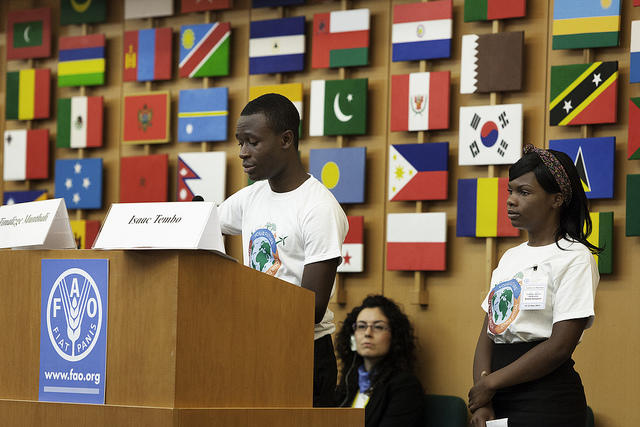Improved nutrition is vital for food security and sustainable development, say world experts

University students from Malawi brought messages of hope and action during the Nutrition and Sustainability Seminar on 12 November, one day ahead of a technical meeting leading up to the 2nd International Conference on Nutrition in 2014.
University students from Malawi brought messages of hope and action from their country during presentations at the 'Nutrition and Sustainability' Seminar on 12 November, one day ahead of a technical meeting leading up to the 2nd International Conference on Nutrition in 2014.
“Let’s start thinking about the future; the future begins with us,” said Malawi students Isaac Tembo and Timalizge Munthalie.
Tembo and Munthalie were among an array of speakers who addressed hundreds of people attending the all-day seminar at Food and Agriculture Organization of the UN (FAO), in Rome, Italy.
Malawi has estimated losses of $US446 million annually due to undernutrition. Their country faces erratic rainfall, drought, flooding and extreme weather. About 47 percent of children under-five in Malawi are stunted.
But Tembo and Munthalie talked about transformation, describing how they are university students who are part of youth groups making change and how they take steps in their own lives to deal with climate change. Their message reflected the broader theme, that food security is intricately connected to agricultural sustainability and nutrition – and to the post-2015 Sustainable Development Goals.
The event brought together 300 scientists, policymakers, experts, students and practitioners to discuss practical ways to link nutrition and sustainability and move from dialogue to action.
The keynote address given by Hans Herren, one of the world’s leading experts on sustainable agriculture, and winner of the 1995 World Food Prize and the 2013 Right Livelihood Award, was supported by Bioversity International.
He emphasized the need to shift from linear to more dynamic thinking to transform our food systems, with people at the centre of the circle. “It's about the whole system, there has to be a major shift. We have emphasized production - what about the other side: people eating? If people continue just wanting to eat cheap food, nothing is going to change in the food system,” he said.
Herren made an explicit link between sustainable agriculture, biodiversity and food systems and sustainable development, echoed by speakers who followed him including Jeffrey Sachs. The presentation by Jeffrey Sachs stressed the need for sustainable nutrition as a keystone of the Sustainable Development Goals.
“The food challenge is one of the most central challenges for the post-2015 world,” Sachs said, calling the current food system “a complete morass.” He called for goals for children’s nutrition and for non-communicable diseases in the post-2015 agenda, adding that sustainable nutrition directly relates to sustainable agriculture, health for all, and childhood development and education.
Practical steps were stressed throughout the daylong seminar, including:
- Case studies from countries and policies in development on sustainable diets/nutrition/climate change
- Resource sharing such as books, events, networks about sustainable diets and food systems
- Possible guidelines for the catering sector, a major player in food in many countries and their leadership could transform food systems
- Different approaches to learn from and reach consumers and affect behavior change
- Increased attention to diminishing biodiversity – as an ecosystem service but also a source of nutrition
- Emphasis on gender strategies – recognizing that half of the world’s farmers are women and that men and women have different nutritional needs and concerns
- Movement beyond 'eat local' campaigns into more emphasis on how food was produced and transported and linking what is on the plate to better agricultural and health policies
- Finland has examples of an environment passport for catering services in development, checklists for consumers, and projects that combine health and sustainability including climate-friendly lunches for catering
- Insights from countries including Malawi, Spain, Colombia, Germany, Finland and Ireland on how they are dealing with sustainable agriculture and food systems
Edith Mkawa from the Government of Malawi provided practical ideas her country is moving forward in its Growth and Development Strategy II, such as better soil management. “Countries which depend on agriculture should put forward policies that deal with climate change and nutrition as they are interlinked and both benefit from increased biodiversity,” she said.
The seminar was jointly organized by the UN Standing Committee on Nutrition (UNSCN), Bioversity International, the Government of Malawi, the Food and Agriculture Organization of the United Nations, and sponsored by the Government of Flanders.
Daniel Gustafson, FAO Deputy Director-General; Edith Mkawa, Permanent Secretary for Nutrition, HIV and AIDS, Office of the President’s Cabinet, Malawi; Ann Tutwiler, Director General, Bioversity International; and Ramiro Lopes da Silva, Chair, UNSCN represented the co-organizers in the opening session.
The meeting was webcast in four languages, and the videos are available for viewing at the following links:
Media contact:
Bioversity International – Kirsten Khire
Photo credit: © FAO/Annibale Greco
